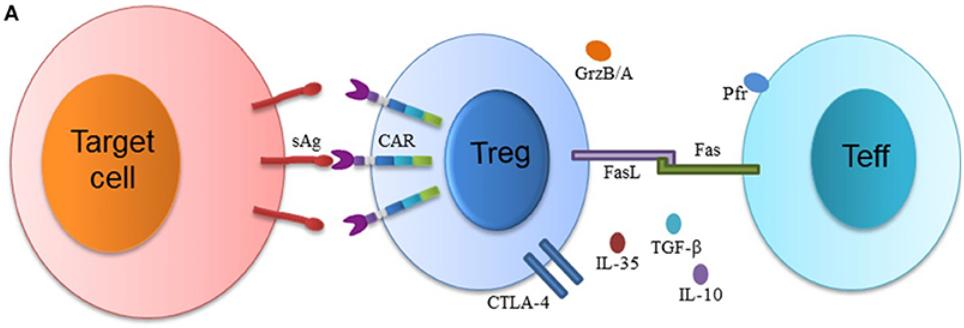All products and services are For Research Use Only and CANNOT be used in the treatment or diagnosis of disease.
Regulatory T cells (Tregs) are a sub-population of T-cells with known immunomodulatory functions. Regulatory T cells (Tregs) mediate a series of immune responses to control immune homeostasis and suppress immune response. CAR-Tregs, by engineering CARs to re-direct human Tregs towards a specific antigen, have great potential as a type of cell therapy to improve immune tolerance in many diseases.
 Fig.1 Scheme of CAR-modified regulatory T cells (CAR-Tregs) and the suppression of effector T cells.1
Fig.1 Scheme of CAR-modified regulatory T cells (CAR-Tregs) and the suppression of effector T cells.1
Characteristics of Treg cells
Regulatory T cells (Tregs) are powerful suppressive cells, with expression of CD4, CD25, and forkhead box P3 (FOXP3). Tregs possess the intrinsic characteristics of widely suppressing T cells with different antigen specificities via bystander inhibition and inducing other suppressive cells via infectious tolerance. Based on its powerful modulation function, Tregs have been used to regulate immune responses in several fields, such as transplantation, autoimmune diseases, and gene therapy. Although there is a low number of Tregs that can be isolated from donor peripheral blood, expansion in vitro under GMP conditions and generating enough quantity of Treg cells for clinical use is feasible.
Advantages of CAR-Tregs
Tregs-based cellular therapies include TCR- and CAR-Tregs approaches, which are superior to polyclonal Tregs in the suppression function. Generally, Tregs need to migrate to disease-related target organs to generate sufficient suppression effects. Therefore, CAR-Tregs have a stronger suppression than polyclonal Tregs because antigen-targeting CAR-Tregs could migrate to a target organ presented with a specific antigen. In contrast to polyclonal Tregs-mediated non-specific immunosuppression, CAR-Tregs-mediated inhibition is antigen-specific, producing fewer side effects associated with general immunosuppression, which allows to achievement of disease-specific immunosuppression. In addition, CAR-Tregs appear to exhibit non-MHC-restricted recognition, as well as less dependence on IL-2 compared to TCR-Tregs.
CAR-Treg cells have been considered a promising approach with many features:
CAR-Treg Cells at Creative Biolabs
Based on the advantages of CAR-Treg cells, Creative Biolabs is committed to providing comprehensive CAR-Treg development strategies and related CAR-Treg products to meet the needs of all aspects. With our professional experience in immunotherapy discovery and development, we are confident in delivering the desirable outcomes and products for each of our customers. In addition, we specialize in customizing special CAR products according to the customer's special needs. Please don't hesitate to contact us or inquire about an appropriate product or special solution for you.
Reference
Associated Antigen Target
 NEWSLETTER
NEWSLETTER
The latest newsletter to introduce the latest breaking information, our site updates, field and other scientific news, important events, and insights from industry leaders
LEARN MORE NEWSLETTER NEW SOLUTION
NEW SOLUTION
CellRapeutics™ In Vivo Cell Engineering: One-stop in vivo T/B/NK cell and macrophage engineering services covering vectors construction to function verification.
LEARN MORE SOLUTION NOVEL TECHNOLOGY
NOVEL TECHNOLOGY
Silence™ CAR-T Cell: A novel platform to enhance CAR-T cell immunotherapy by combining RNAi technology to suppress genes that may impede CAR functionality.
LEARN MORE NOVEL TECHNOLOGY NEW SOLUTION
NEW SOLUTION
Canine CAR-T Therapy Development: From early target discovery, CAR design and construction, cell culture, and transfection, to in vitro and in vivo function validation.
LEARN MORE SOLUTION